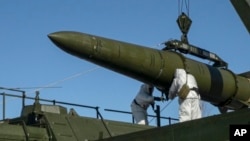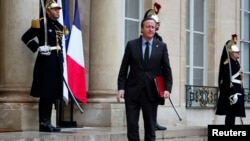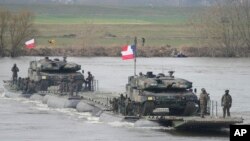Russia plans to perform drills involving tactical nuclear weapons, in response to what it called "provocative statements and threats from France, Britain and the United States regarding the Russian Federation," the Russian Defense Ministry said in a statement, a warning that tensions with the West are deepening over the war in Ukraine.
The statement Monday was in response to recent remarks by British Foreign Secretary David Cameron and French President Emmanuel Macron as well as the delivery of U.S. long-range ATACMS, or Army Tactical Missile Systems, to Ukraine.
"They are deliberately leading the situation towards a further escalation of the Ukrainian crisis towards an open military clash between NATO countries and Russia," the Russian foreign ministry said, and added, "we hope that this event will cool down the 'hotheads' in Western capitals."
Macron repeated last week that he doesn't rule out sending troops to Ukraine, while Cameron said Kyiv's forces will be able to use British long-range weapons to strike targets inside Russia. “Just as Russia is striking inside Ukraine, you can quite understand why Ukraine feels the need to make sure it's defending itself," Cameron said in an interview with Reuters last week.
France on Monday dismissed ongoing Russian reports as a "disinformation campaign," denying sending troops to Ukraine.
"No, France did not send troops to Ukraine," the foreign ministry said in a post on X, replying to recent reports about the deployment of the French Foreign Legion to Ukraine.
This was the first time that Russia has announced drills involving tactical nuclear weapons. Tactical nuclear weapons include air bombs, warheads for short-range missiles and artillery munitions and are meant for use on a battlefield. They are less powerful than the massive warheads that arm intercontinental ballistic missiles, which are intended to obliterate entire cities.
Russia also lashed out at NATO's four-month-long military exercises, known as “Steadfast Defender.”
Russian foreign ministry spokesperson Maria Zakharova said in a statement Saturday that NATO’s expansive military exercises close to Russia’s borders are proof that the Western alliance is preparing for a potential conflict with Russia.
NATO is currently holding the “Steadfast Defender" exercise — the largest demonstration of military power the transatlantic alliance has performed in the North Atlantic, Arctic seas and across Europe since the end of the Cold War.
President Vladimir Putin warned the West last March that a direct conflict between Russia and the U.S.-led NATO military alliance would mean the planet was one step away from World War Three, adding hardly anyone wanted such a scenario.
The Russian president has faced pressure from some hardliners inside Russia to reword Russia's nuclear doctrine, changing the conditions under which Russia would use a nuclear weapon, though Putin said last year he saw no need for change.
"We do not see anything new here," said Andriy Yusov, a spokesperson for Ukrainian military intelligence. "Nuclear blackmail is a constant practice of Putin's regime," he said, reiterating what Ukrainian officials and some Western officials have said in the past that Russia is bluffing over nuclear weapons to scare the West.
Since Russia launched its full-scale invasion of Ukraine in 2022, Moscow has repeatedly warned that the United States and its European allies are pushing the world to the brink of nuclear confrontation by supporting Ukraine with tens of billions of dollars of weapons, some of which are being used against Russian territory.
U.S. President Joe Biden said last year that he felt there was no real prospect of Russia using nuclear weapons, but CNN reported that in interviews top U.S. officials, who wanted to remain anonymous due to the sensitivity of the issue, said the U.S. prepared “rigorously” for a potential Russian nuclear strike in Ukraine in late 2022.
Meanwhile, Ukraine and its Western allies say Russia’s war in Ukraine is an imperial-style land grab by a corrupt dictatorship. Ukrainian President Volodymyr Zelenskyy has repeatedly warned that Russia’s expansionist goals won’t end in Ukraine.
Western leaders have vowed to support a defeat of Russian forces in Ukraine, while ruling out any deployment of NATO personnel there.
Russia and the United States are the world’s biggest nuclear powers, possessing more than 10,600 of the world's 12,100 nuclear warheads. China has the third-largest nuclear arsenal, followed by France and Britain.
Russia has about 1,558 non-strategic nuclear warheads, according to the Federation of American Scientists, though there is uncertainty about exact figures for such weapons due to a lack of transparency.
No power has used nuclear weapons in war since the United States unleashed the first atomic bomb attacks on the Japanese cities of Hiroshima and Nagasaki in 1945.
Some information for this report came from Reuters, The Associated Press and Agence France-Presse.















